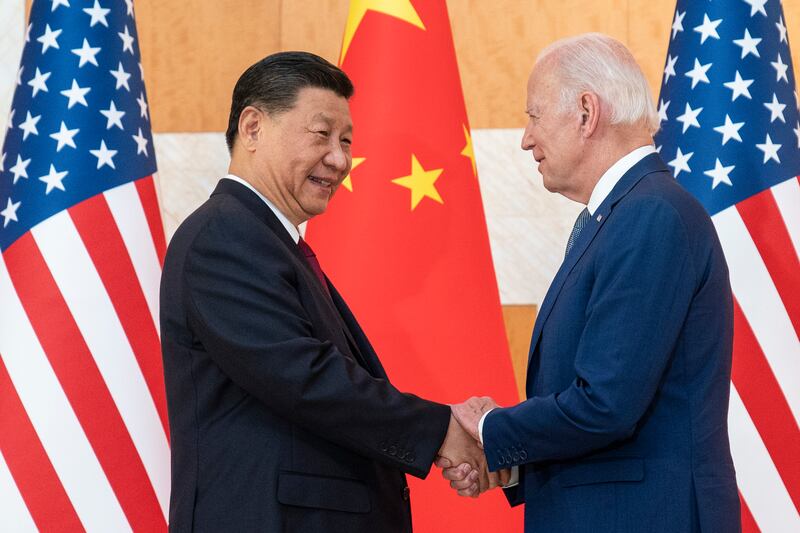The television images of President Joe Biden and President Xi Jinping shaking hands during last month’s G20 meetings in Bali, not to mention the more substantive three-hour executive-level talks that followed, kindled hope that relations between the two countries can proceed along the lines of dialogue. That the two leaders disavowed a nuclear option to solving heightened tensions between the two nations gave some assurance that diplomacy might prevail over hawkish bravado.
On a personal level, their symbolic rapprochement — literally mano-a-mano — reminded me that restoring a working relationship between the two countries hinges in no small part on our ability as citizens to put faces and names with those experiences we have had with China if we are to avert what many see as unavoidable conflict between the two countries.
Like Xi (whose own father was a pioneer in the economic changes unleashed in Guangdong province in the 1970s), though on a much more modest scale, I have my own China journey that began with my father and continues to this day.
In 1980, my father made the first of two trips to Beijing and Shanghai to negotiate cotton seed contracts with the Chinese government at the dawn of that nation’s momentous opening. As a 9-year-old boy, I hung on the verbal and visual snapshots of a world long shrouded by a bamboo veil of ignorance, which my father literally helped open as an agronomist working for Delta Pine & Land Company.
When I was 15, I watched a film on the opening of China in my social studies class and sat open-mouthed when images of the trade convention he had attended in Beijing flashed across the screen. I knew my father had done something important.
His stories of the people, their industriousness and potential cannot be forgotten and squared with my later experiences with the Chinese and China itself.
My father was 33 when he first visited China. Years later, as a 36-year-old director of international education at a university in Alabama, I flew to Shanghai to negotiate an educational agreement with New Century High School.
Though not so worldly wise at the time, I was grateful to the administrators and faculty of the school who acceded to my request to toast our new friendship — Ganbei! (Cheers) — with 7-Up rather that the traditional hard liquor (also on the table) at the beginning of our negotiations. Their generosity of spirit — though without the traditional spirits — opened the way to a successful agreement.
A year later, I appreciated the patience and enthusiasm of a young man from Shenyang (an industrial metropolis in northern China, close to the Korean peninsula), named Bo, who gave me rudimentary lessons in Mandarin Chinese prior to my third and final business trip to China in 2009. He walked me through basic words, then elementary verb forms in preparation to be able to negotiate the more superficial aspects of my time in Beijing, Dalian, and his hometown.
It was on a traffic-choked ring road in Beijing on that trip that I initiated a very brief conversation with a taxi driver. I simply told him that I was American, that I was in China for work, and that I had a wife and daughter at home. His long-suffering, in the form of nodding acknowledgement that he understood, helped me see the beauty of language — that it can bridge gaps as much as it can inflame impersonal rhetoric.
More recently, I cannot forget the kindness and attention to detail of a concierge on a cruise ship. We spoke with Kay while we were making arrangements to exit the ship with a child with special needs.
When I saw that her name badge listed China as her home country, I rattled off the cities I had visited earlier in my career. Her eyes lit up with each metropolis that many of us may not even recognize: Suzhou, Hangzhou, Beijing, Dalian, Shenyang, Shanghai. We chatted some more and then she made arrangements for our departure from the ship. We went on our way.
Later that afternoon when we returned to our cabin, we found a thick envelope waiting for us. Upon opening the seal, we found a message, dated Dec. 26, 2021, which read as follows:
Dear Evan & Jennie, It’s a great pleasure to meet you, and have the lovely chat. Glad to hear Evan loves China, had great trips there. Just a little Chinese patterns (referring to the origami swans and butterflies she included in the envelope) for the good Chinese memories! Safe trip home and hopefully see you next time.
Yes, China and the United States have their differences. They were on display this year, but that moment of conciliation between the two heads of state reminds us that people like you or me engage with the Chinese from time to time and we should look for ways to extend the warmth and understanding that those encounters create.
Utah has been a pacesetter with the first China Summit, held earlier this year with more to follow. Personally, my goal is to resume my Mandarin lessons because I envision more positive interactions with China and the Chinese in the future.
Evan Ward is associate professor of history at Brigham Young University where he teaches courses on world history.

